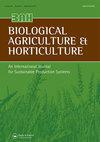Dr David Hodges – Founding Editor of Biological Agriculture & Horticulture
IF 1.6
4区 农林科学
Q3 AGRONOMY
引用次数: 1
Abstract
It is with great sadness that I write to announce the death of Dr David Hodges, Founding Editor of Biological Agriculture & Horticulture. David Hodges was born in 1934 and spent his early childhood years in places close to London and then in Devon, England. Hodges studied Zoology at Exeter University, where he met his wife Ursula (nee Rumley). After graduating in 1957, Hodges moved to London to undertake research for a PhD at the Institute of Urology of London. Just at the point of submitting his thesis in 1960 Hodges was drafted in for national service at the Royal Army Medical Corps, hence the completion of his PhD had to be delayed until 1962. According to Hodges himself, one of the most valuable things he learnt from his time with the army was the futility of war and he became a pacifist not long afterwards (Hodges 1988). Ursula and David Hodges were married in 1958, and in 1962, after Hodges’ national service, they moved to Ashford in Kent, England, where he took up a lecturing post at Wye College, the School of Agriculture of the University of London. Hodges’ role at Wye College was initially intended to be mainly associated with research into the physiology of laying hens and he spent a number of years investigating calcium metabolism and digestive function in battery hens. Hodges’ research experience in intensive poultry production opened his eyes to what was happening in industrial food production, and this, together with reading Rachel Carson’s Silent Spring, soon began to change his whole outlook. Hodges was convinced that the industrial approach to agriculture was morally wrong and that in practice it would create more problems than it would solve (Conford 2011a, 2011b). He developed a strong interest in all matters related to organic agriculture and, although his work at Wye College was mainly teaching and to undertake research in the field of animal physiology, being in a School of Agriculture gave him the necessary justification to become involved in the wider aspects of organic farming. In the years that followed, Hodges came to have a very a prominent role in the organic agriculture movement in Britain. Indeed, with his specific interest in the scientific exploration of organic agriculture and pursuit for developing the scientific case for organic farming, the remarkable work of Dr David Hodges was the subject of an agricultural history paper written by Conford (2011a). Hodges acknowledged that, academically, his work in organic farming had not always been an easy task and it had often been an uphill struggle to convince those with whom he worked that the organic option was something worth looking into. Even in the face of considerable evidence of the BIOLOGICAL AGRICULTURE & HORTICULTURE 2019, VOL. 35, NO. 4, 215–218 https://doi.org/10.1080/01448765.2019.1662661大卫·霍奇斯博士是《生物农业与园艺》杂志的创始编辑
我怀着极大的悲痛写信宣布《生物农业与园艺》创始编辑David Hodges博士去世。大卫·霍奇斯出生于1934年,早年在伦敦附近的地方度过,后来在英国德文郡度过。Hodges在埃克塞特大学学习动物学,在那里他遇到了他的妻子Ursula(nee Rumley饰)。1957年毕业后,霍奇斯搬到伦敦,在伦敦泌尿外科研究所攻读博士学位。就在1960年提交论文的时候,霍奇斯被征召到皇家陆军医疗队服役,因此他的博士学位不得不推迟到1962年完成。根据霍奇斯自己的说法,他从军队学到的最有价值的东西之一是战争的徒劳,不久后他成为了一名和平主义者(霍奇斯1988)。Ursula和David Hodges于1958年结婚,1962年,Hodges服完兵役后,他们搬到了英国肯特郡的Ashford,在那里,他在伦敦大学农业学院Wye学院担任讲师。Hodges在怀伊学院的角色最初主要与蛋鸡生理学研究有关,他花了多年时间研究电池母鸡的钙代谢和消化功能。霍奇斯在集约化家禽生产方面的研究经历让他看到了工业食品生产中正在发生的事情,这一点,再加上阅读雷切尔·卡森的《寂静的春天》,很快开始改变他的整个观点。Hodges确信,农业的工业化方法在道德上是错误的,在实践中,它会产生比解决更多的问题(Conford 2011a,2011b)。他对所有与有机农业有关的问题产生了浓厚的兴趣,尽管他在怀伊学院的工作主要是在动物生理学领域进行教学和研究,但在农业学院的工作为他参与有机农业的更广泛方面提供了必要的理由。在接下来的几年里,霍奇斯在英国的有机农业运动中发挥了非常重要的作用。事实上,由于David Hodges博士对有机农业的科学探索特别感兴趣,并致力于开发有机农业的科研案例,他的杰出工作成为Conford(2011a)撰写的一篇农业史论文的主题。霍奇斯承认,在学术上,他在有机农业方面的工作并不总是一项容易的任务,要说服与他共事的人相信有机选择是值得研究的,往往是一场艰苦的斗争。即使面对《2019生物农业与园艺》第35卷第4期215–218的大量证据https://doi.org/10.1080/01448765.2019.1662661
本文章由计算机程序翻译,如有差异,请以英文原文为准。
求助全文
约1分钟内获得全文
求助全文
来源期刊
CiteScore
3.30
自引率
6.70%
发文量
18
审稿时长
>36 weeks
期刊介绍:
Biological Agriculture & Horticulture aims to act as the central focus for a wide range of studies into alternative systems of husbandry, and particularly the biological or organic approach to food production. The Journal publishes work of a sound scientific or economic nature related to any aspect of biological husbandry in agriculture, horticulture and forestry in both temperate and tropical conditions, including energy and water utilization, and environmental impact.

 求助内容:
求助内容: 应助结果提醒方式:
应助结果提醒方式:


